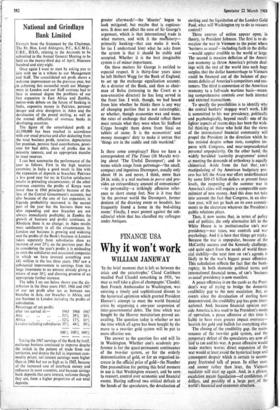Why it won't work
FINANCE USA WILLIAM JANE WAY
'In the brief moment that is left us between the crisis and the catastrophe,' Claud Cockburn recalled Paul Claudel remarking in 1931, 'we may as well take a glass of champagne.' Claudel, then French Ambassador to Washington, was entering a timely and sophisticated dissent to the hysterical optimism which greeted President Hoover's attempt to meet the world financial crisis by organising a one-year suspension of inter-governmental debts. The time which was bought by the Hoover moratorium proved un- availing. The question today is whether or not the time which all agree has been bought by the move to a two-tier gold system will be put to more effective use.
The answer to the question lies and will lie in Washington. Whether one's academic pre- ference is for the quasi-permanent continuance of the two-tier system, or for the orderly demonetisation of gold, or for an organised in- crease in the official price of gold—the Number One precondition for putting this brief moment to use is that Washington reassert, and be seen to reassert, control over economic and financial events. Having suffered two critical defeats at the hands of the speculators, the devaluation of sterling and the liquidation of the London Gold Pool, what will Washington try to do to reassert control?
Three courses of action appear open, in theory, to President Johnson. The first is to de- escalate the war in Vietnam to the point where 'business as usual'—including faith in the dollar —would appear credible to the world at large. The second is massive deflation of the Ameri- can economy to throw America's private deal- ings with the rest of the world into such huge surplus that the dollar haemorrhage to Vietnam could be financed out of the balance of pay- ments deficits of America's competitors and cus- tomers. The third is conversion of the American economy to a full-scale wartime basis—mean- ing comprehensive controls over both internal and external transactions.
To specify the possibilities is to identify why the central bankers' stopgap won't work. LBJ is committed to his war presidency, politically and psychologically, beyond recall: one of the lighter aspects of recent days has been the wish- ful thinking of those who hold that the views of the international financial community will propel the President in the direction which he has resisted despite urban riots, complete im- passe with Congress, and near-unprecedented personal unpopularity. On the other hand, the widely heralded 'austerity programme' aimed at meeting the demands of orthodoxy is equally chimerical. Aside from the fact that LW'S manipulating of the American budgetary pro- cess has left the Asian war effort underfinanced by some $10-15 billion dollars at present force levels, the reopening of the summer war in America's cities will require a comparable corn- mitment of new money. And this does not take into account the fact that Congress, in an elec- tion year, will not go back on its own commit- ments to the electorate whatever the President's public relations ploys.
Thus, it now seems that, in terms of policy and of politics, the only alternative left to the White House is to institutionalise un's war presidency—war taxes, war controls and war psychology. And it is here that things get tricky. Because the war is unpopular, because of, the McCarthy success and the Kennedy challenge, and quite apart from the needs of world finan- cial stability—the next item on Lars agenda is likely to be the war's biggest peace offensive. This calculation reflects the fact that the bank- ruptcy, in both domestic political terms and international financial terms, of Ltu's 'business as usual' presidency is now manifest.
A peace offensive is on the cards as the Presi- dent's way of trying to bridge the domestic credibility gap to the next escalation. But, as events since the devaluation of sterling have demonstrated, the credibility gap has gone inter- national. And, because financial opinion out- side America is less used to the President's mode of operation, a peace offensive at this time is liable to have even greater impact overseas— bearish for gold and bullish for everything else.
The closing of the credibility gap, the main- tenance of the two-tier gold system, and the temporary defeat of the speculators are now all tied to LW and his war. A peace offensive would make matters worse; direct expansion of the war would at least avoid the hysterical hope and consequent despair which is certain to accom- pany frustrated talk of peace. In either case, and sooner rather than later, the Vietnam escalator will start up again. And, in a phrase, escalation means liquidation—of confidence, of dollars, and possibly of a large part of the world's financial and economic structure.






































 Previous page
Previous page